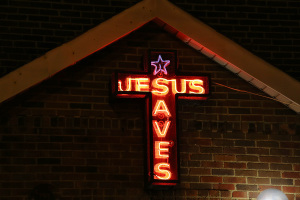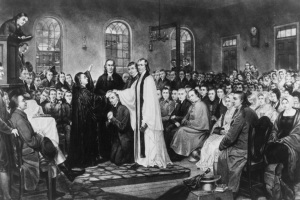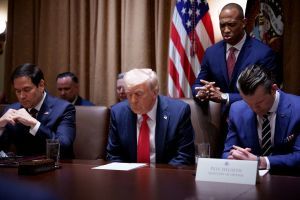So. Baptists Stand Against IMB's Tongues, Baptism Guidelines
Correction appended
A group of Southern Baptists are revisiting a controversy by calling their international missions agency to remove restrictions from candidates who speak privately in tongues and have been baptized by immersion following conversion, but was not baptized by a proper administrator or another Baptist who believes in eternal security.
Thirty-seven former Southern Baptist missionaries, former International Mission Board trustees and Southern Baptist pastors have signed a statement expressing their "strong" disagreement with a 2005 decision by the IMB trustees that ruled out the appointment of missionary candidates who practice speaking in tongues in public or a "prayer language" in private and who have not been baptized properly, according to the new guidelines.
"We are alarmed at the reports of the rejection of otherwise worthy candidates and reports of individuals who will now not even bother to apply to their own denomination's missions organization, lest these guidelines disqualify them," the statement, which was released Monday, says. "We are dismayed that one of the results of the implementation of these guidelines is the loss of valuable, faithful IMB personnel."
"Let us as Southern Baptists not purposefully turn away any qualified worker who has heard and obeyed the call to 'Go,'" the statement reads.
The signatories argue that the International Mission Board's guidelines for candidacy stray "far beyond the parameters" set by the Southern Baptist Convention's statement of faith - the Baptist Faith and Message.
In 2005, the International Mission Board stirred debate when it adopted a policy that barred missionaries who practice private prayer language. The agency already had policies in place barring missionary candidates who practice public glossolalia (speaking in tongues) but went further to ban those who practice it in private. The adopted baptism guideline stated candidates must have been baptized in a Southern Baptist church or in a church of another denomination that practices believer's baptism by immersion alone and the administrator of the baptism must believe in eternal security.
Amid ongoing debates, IMB trustees revised the mission board's policy in May 2007, terming it "guidelines" rather than "policies." But the agency retained much of the original wording and reaffirmed the main provisions of the "guidelines."
Paul Chitwood of Kentucky, chairman of the trustees' mission personnel committee, said "the rapid spread of neo-Pentecostalism and its pressure exacted on new churches in various regions of the world warrants a concern for the clear Baptist identity of our missionary candidates."
"Furthermore, the diversity of denominational backgrounds among missionary candidates requires a clear baptism guideline to guide the work of our candidate consultants as they consider the qualification of candidates," he said at the time of the revision.
The revisions, which came after a year of review, were not made to create further controversy but rather to bring the study on the matters "to completion" and allow the agency to focus on its world mission task, Chitwood also noted.
But many Southern Baptists do not feel the matters are settled and remain concerned over the restrictions.
Signatories of the statement calling for a reversal say they are "disturbed" that the guidelines have led to "the intrusive scrutiny into the sanctity of the personal prayer closet."
"Many faithful brothers and sisters who are members of Southern Baptist churches differ on this issue as they seek to live out their lives in obedience to Christ," the statement continues. "The Bible at no point raises this issue to a matter of primary doctrinal importance, thus it should not disqualify any godly missionary candidate for service with the International Mission Board."
They further argue that the baptism guideline places the IMB board in the position of "dictating to local churches what constitutes a legitimate Christian baptism."
"With no anecdotal evidence from the field of wide-spread charismatic practices within our missionary family, and acknowledging that Southern Baptist churches are competent to judge the biblical nature of their members' baptisms, we strongly urge Southern Baptists to seek the removal of these controversial and superfluous guidelines from use in the candidate approval process," the statement reads.
Since the new guidelines were put in place, Southern Baptists have remained divided on whether the IMB trustees acted appropriately.
Frank Cox, pastor of North Metro First Baptist Church in Lawrenceville, Ga., who is running for presidency of the Southern Baptist Convention, believes the trustees "acted in line" with their responsibility and that their action on the issue of baptism and private prayer language "was appropriate in keeping with the doctrinal integrity as to who we are as Southern Baptists," according to Baptist Press.
Meanwhile, William L. (Bill) Wagner, a former Southern Baptist missionary who is also up for SBC president this year, doesn't believe the trustees' action was appropriate.
"We have lost some wonderful missionaries because of this decision. We already have the Baptist Faith and Message document. It has served us well. We do not need to add to it," Wagner recently told Baptist Press. "I know much about this action at the IMB, and I feel that there was too much political reasoning involved in the decision. We as Baptists need to put politics aside and get back to our main task of winning people and making them disciples."
Despite disagreements, the group of signatories – which are being added to – asserted their support for the missions agency and commended the more than 5,000 IMB missionaries who have committed to spreading the Gospel.
On the Web: imbchange.info
Correction:Monday, June 2, 2008:
An article on Monday, June 2, 2008, about a new statement signed by a group of Southern Baptists and former missionaries incorrecty reported that the International Mission Board's missionary candidacy guideline on baptism bars those who have not been baptized by immersion. The baptism guideline requires candidates to have been baptized in a church that practices believer's baptism by immersion alone and by a proper administrator or another Baptist who believes in eternal security.





























